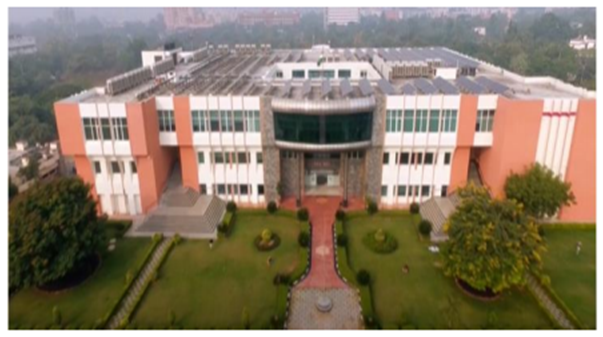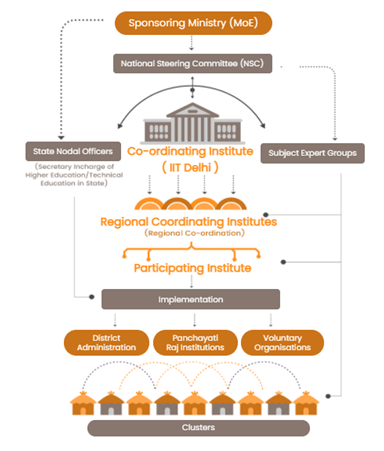IMPORTANCE OF BEING A PI OF THE UNNAT BHARAT ABHIYAN BY MINISTRY OF EDUCATION, GOVERNMENT OF INDIA
Working as a Participating Institute under the aegis of Unnat Bharat Abhiyan proffers many benefits. The PI will be recognized by MHRD, GOI for carrying out the activities for the upliftment of the rural population residing in the villages around them. The arrangement provides a chance to become a working component of the team of 100+ institutes around the designated region.
Working under UBA will have a significant positive effect on the goodwill and reputation of the participating institutes at the national level. The project of upliftment under UBA will provide a chance to search for innovative solutions for the life challenges of the rural population. The PI will get funds for innovating the solutions and for their implementation in the targeted villages.
The participating institute could work for their district by adopting nearby villages. Thus, would improve the living standards of the rural population around them. The participating institute could encourage more rural students to get enrollments in higher education. The participating institute would get proper guidance and resources for all the activities conducted for the upliftment of the rural population of the adopted villages.
Kindly find all pertinent information below for your reference:
- About the program -- UNNAT BHARAT ABHIYAN
[https://unnatbharatabhiyan.gov.in:8443/introduction] - The conceptualization of Unnat Bharat Abhiyan started with the initiative by IIT Delhi working for a long in the area of rural development and appropriate technology. The concept was nurtured through wide consultation with the representatives of several technical institutions, Rural Technology Action Group (RuTAG) coordinators, voluntary organizations, and government agencies, actively involved in rural development work.

- Organizational Structure of UBA
[https://unnatbharatabhiyan.gov.in:8443/organisational_structure] - National coordinating institute ➡ Regional coordinating institute ➡ Participating Institute ➡ rural development activities.
- About RCI
[https://unnatbharatabhiyan.gov.in:8443/regional-coordinating-institutes] - The Regional Coordinating Institutions (RCIs) are identified based on their earlier experience and infrastructural competence etc. These institutions will act as nodal centers for promoting & facilitate the UBA network in their region. These will be responsible for grooming the other participating institutions in their region in addition to carrying out their own village cluster activities.
- About PI
[https://unnatbharatabhiyan.gov.in:8443/participating_institute] -
All participating institutions (PIs) are expected to establish a UBA Cell which will be responsible for carrying out the activities of the UBA. To guide and monitor the activities of the UBA Cell in each institution, there will be an Executive Committee and a local advisory committee (which will be chaired by the Head of the Institution).
The main responsibility of a UBA cell will be primarily to develop linkage with selective rural clusters, involve in the planning process, and promote the requisite S&T interventions to improvise and expedite the developmental efforts in those clusters. On the other hand, a UBA cell will also be responsible for developing the competence of its working group by appropriate orientation, training, and creation of appropriate ethos within the institution towards indigenous and sustainable rural development, and initiating requisite curricular modifications and other facilitating measures.
All participating institutions will be facilitated and mentored in their activities by the respective mentoring institutions in their region.
- About the process to be a part of UBA as PI –
● For details and joining the UBA program https://unnatbharatabhiyan.gov.in:8443/faq3
● Please use the registration URL http://115.124.102.238:8081/ to join UBA
●Kindly go through the following links for completing your registration https://www.youtube.com/watch?v=x56DQJkgelI&feature=youtu.be
https://www.youtube.com/watch?v=g7ILWONQWjs&feature=youtu.be
In case of any clarification or query, please feel free to contact us.
Looking forward to hearing from you and joining hands to achieve UBA objectives of rural development.
Process of registering as a PI
Keynote by coordinator UBA
Unnat Bharat Abhiyan, a flagship national program of Ministry of Human Resource Development (MHRD) Government of India and IIT Delhi has been designated to function as lead and coordinating organization for UBA activities in the country. Unnat Bharat Abhiyan is inspired by the vision of transformational change in rural development processes by leveraging knowledge institutions to help build the architecture of an Inclusive India.
The Mission of Unnat Bharat Abhiyan is to enable participating higher educational institutions to work with the people of rural India in identifying development challenges and evolving appropriate solutions for accelerating sustainable growth. It also aims to create a virtuous cycle between society and an inclusive academic system by providing knowledge and practices for emerging professions and to upgrade the capabilities of both, the public and the private, sectors in responding to the development needs of rural India.

Implementation Strategy (From PI prospective)
- The Higher Education Institutions will be selected from both technical and non-technical institutes based on the parameters such as - history of engagement with rural communities, adequate faculty and commitment to the programme objectives.
- The selected institutions will strive to seek the solutions for improving the social and economic well-being of the rural communities in association with district authorities’/other institutions and NGOs.
- Institutions are expected to do field studies, study the implementation of Government schemes, and facilitate their better implementation so that they meet their objectives best.
- The funds will be provided for work done under the scheme, however overhead expenses like field visits which are not specifically mentioned to be funded by the scheme will be managed by the institute from their own budget.
- PIs should engage interested faculties, students, NSS and other bodies of the institutes engaged in community activities.
- There is a Provision of additional incentives to PIs, if they manage to receive grants from other sources.
Selection of the Participating Institutions (PIs) and Further Processes
- Higher Educational Institutions would be selected from the applications received in response to an open advertisement for participation in Unnat Bharat Abhiyan. The selection is based on challenge Mode. Selection of institutions would be followed by a training and orientation programme to expose the institutions to rural engagement mechanisms, rural technologies, and practices in present time. The orientation sessions will be organized jointly by RCI and the National Coordinating Institution.
- The registration is online on the UBA website. The registration portal remains open for new institutions throughout the year. The results of selected institutions will be announced quarterly on the UBA website.
- After registration and selection of the institutes under the UBA, a token amount of Rs.10,000/- per village would be released under the UBA program. The funds are mainly meant for assistance for awareness, Gram Panchayat Development Plan (GPDP) study, need assessment, and contingency expenditure.
- Login credentials will be provided to each selected participating institution for UBA Reporting Portal to upload survey data on the UBA website. This ‘REPORTING PORTAL' can be used by all participating institutes to feed data obtained from Village and Household surveys, preparing plans and reporting their complete work progress.
- The selected institutions will work for providing suitable solutions which can improve the social and economic well-being of the rural communities.
- The solutions selected/ customized should be sustainable, innovative, implementable and scalable. There is a provision of additional grants under the scheme. These grants are targeted to the situations where technological solutions are to be developed or existing technological solutions need customization. The Provision of grants can be realized on the recommendation of the subject expert groups.
- Identification of solutions by the Institutions would take place after a qualitative engagement with the rural people, local bodies, district authorities and obtaining a clear insight into the problems and requirements of the adopted villages.
- The solutions proposed should be uploaded on the UBA portal giving a clear statement of the problem, proposed solution, with proof of requirement & willingness to fund the solution by the District Authorities/ Central and State Government/ Corporates/ Philanthropies, cost of the solutions etc. which would be verified by the Subject Expert Group (SEG).
- After evaluation of the proposed solutions, assistance would be recommended by SEG up to Rs.1 lakh per technology for selection of technical solutions and up toRs.50,000/- for customization of any existing solution in a village. This amount is towards meeting the gap in fund availability.
- All selected solutions are to be executed in the village with the assistance of the Gram Panchayat and outcomes to be recorded by the institutions.
- A web-based monitoring system is in place for all progress uploaded on the Portal by the institutions along with photographs.
- The proposed intervention in any village should be discussed, prioritized, and approved by Gram Sabha.

